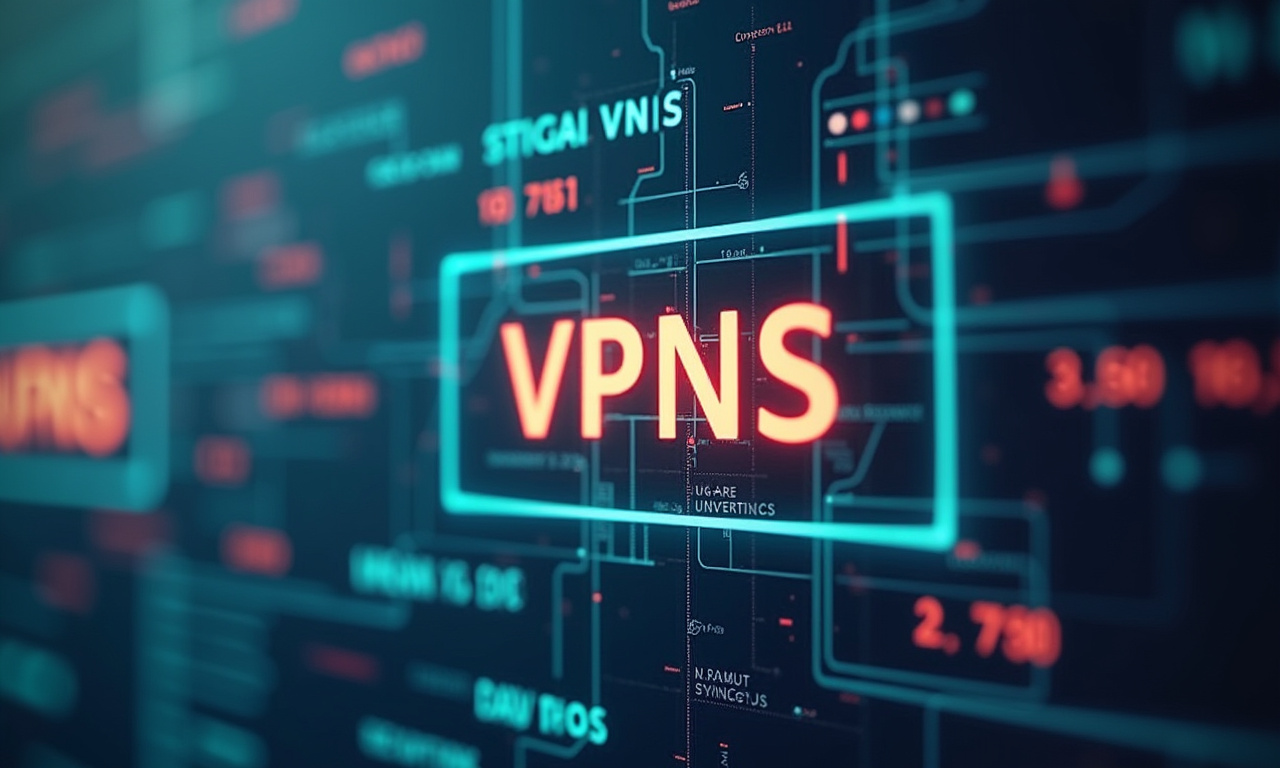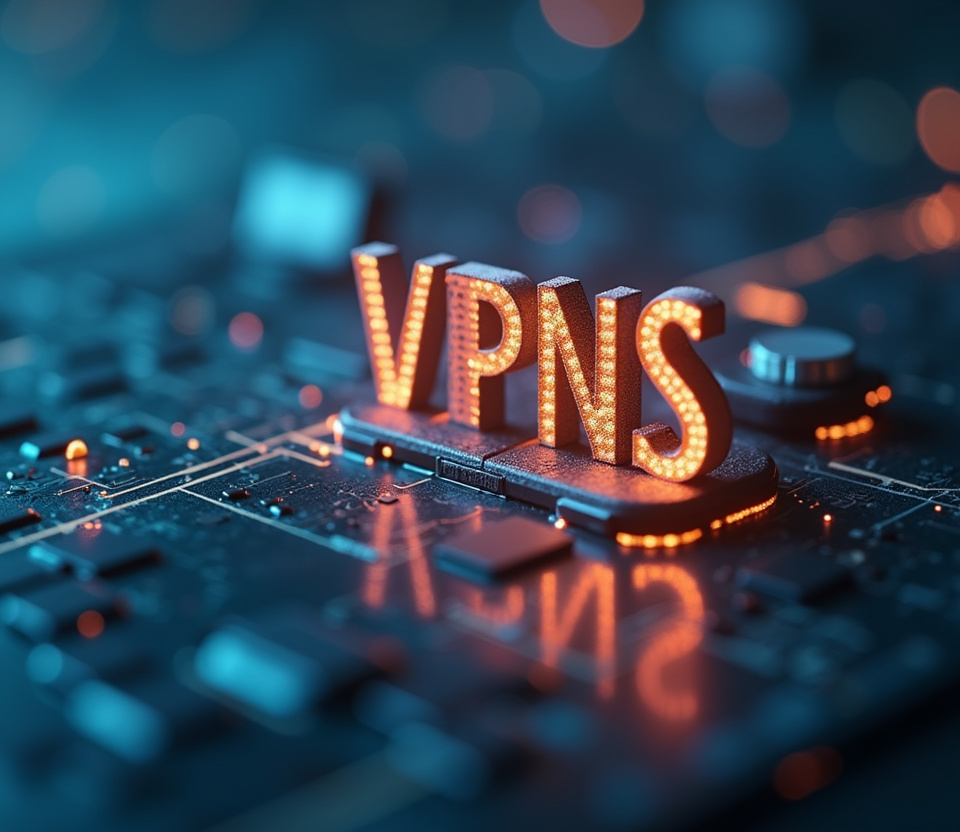VPNs for Supply Chain Management: Enhancing Data Security

Table of Contents
## VPNs for Supply Chain Management: Enhancing Data Security in a Connected World In the rapidly evolving landscape of global commerce, supply chain management (SCM) stands as the critical backbone that connects businesses, suppliers, and consumers worldwide. This intricate network, while enabling unprecedented efficiency and reach, also introduces a complex web of data vulnerabilities that demand robust security measures. Information flows continuously throughout the supply chain, encompassing sensitive data related to product designs, manufacturing processes, pricing strategies, customer details, and logistical operations.
This constant stream of data presents lucrative targets for cybercriminals, prompting the urgent need for sophisticated security solutions. This article will unravel the critical role of Virtual Private Networks (VPNs) in bolstering data security within supply chain ecosystems. We will embark on a comprehensive exploration of how VPNs, acting as secure conduits for data transmission, can effectively mitigate risks, safeguard sensitive information, and ensure the integrity and availability of critical supply chain assets.
VPN implementation within the supply chain transcends basic network security; it signifies a strategic investment in resilience, fosters trust among stakeholders, and solidifies competitive advantage in a data-driven world. The modern supply chain necessitates a paradigm shift in security thinking. Traditional perimeter-based security approaches, while essential, fall short of addressing the distributed nature of modern supply chains.
Data now resides not just within the confines of a company's internal network, but also across a vast network of external partners, cloud-based platforms, and mobile devices. This expanded attack surface exposes sensitive data to a multitude of threats, ranging from data breaches and intellectual property theft to ransomware attacks and supply chain disruptions. The interconnectedness of the supply chain means that a single vulnerability in one organization can have cascading effects throughout the entire network.
A compromised supplier, for instance, can serve as a gateway for attackers to access sensitive data belonging to multiple downstream partners. This highlights the importance of a holistic and proactive security approach that extends beyond the traditional boundaries of the enterprise. VPNs offer a powerful solution to these challenges by creating secure, encrypted tunnels for all data transmitted between authorized parties within the supply chain.
This effectively shields sensitive information from eavesdropping, interception, and unauthorized access, even when data traverses public networks. By encrypting the data stream, VPNs ensure confidentiality, preventing malicious actors from deciphering sensitive information even if they manage to intercept it. VPNs also play a crucial role in maintaining data integrity.
By verifying the authenticity of data packets and preventing tampering, VPNs ensure that the information received is exactly as it was sent, free from malicious modifications or alterations. This is particularly important for sensitive data such as financial transactions, order details, and manufacturing specifications. Furthermore, VPNs contribute to data availability by providing a reliable and secure connection for accessing critical resources, even in the face of network disruptions or cyberattacks.
By setting up redundant VPN servers and implementing failover mechanisms, organizations can ensure that supply chain operations can continue uninterrupted, even in the event of an outage. Ultimately, the strategic deployment of VPN technology empowers organizations to establish a resilient and secure supply chain ecosystem that can withstand the ever-evolving threat landscape. By prioritizing data protection, businesses can foster trust with partners, comply with stringent regulatory requirements, and solidify their competitive positioning in the global marketplace.
supply chain VPN
The risks inherent in neglecting robust security measures within the supply chain are multifaceted and can have devastating consequences. A data breach affecting a supplier, for example, can expose sensitive information about multiple downstream partners, potentially leading to financial losses exceeding millions of dollars, severe reputational damage that erodes consumer trust, and costly legal liabilities stemming from non-compliance with data protection regulations. Intellectual property theft, such as the unauthorized access to product designs, proprietary algorithms, or confidential manufacturing processes, can undermine a company's competitive advantage, stifle innovation, and result in significant revenue losses.
Disruptions to critical logistics operations, often caused by sophisticated ransomware attacks or distributed denial-of-service (DDoS) attacks targeting key infrastructure components, can cripple production schedules, cause substantial order delays, and ultimately harm customer satisfaction, potentially triggering a mass exodus to competing brands. Beyond these direct financial and operational impacts, security breaches within the supply chain can also lead to a loss of trust among stakeholders, including suppliers, distributors, and customers, jeopardizing vital relationships that are essential for long-term success. Traditional security measures, such as perimeter firewalls and intrusion detection systems (IDS), often prove insufficient for addressing the unique challenges posed by the interconnected and distributed nature of the modern supply chain.
While these tools remain essential components of a comprehensive security strategy, they primarily focus on protecting the internal network perimeter, leaving significant gaps in protection when data flows across external networks and third-party systems. Emails, file transfers, and web-based applications commonly used for communication and collaboration within the supply chain can be particularly susceptible to interception, eavesdropping, and man-in-the-middle attacks if not adequately secured. Moreover, the burgeoning use of mobile devices, including smartphones, tablets, and laptops, by supply chain personnel, coupled with the increasing reliance on remote access to critical resources, further expands the attack surface and introduces new avenues for potential security breaches.
A addresses these inherent vulnerabilities by establishing a secure, encrypted tunnel for all data transmitted between authorized entities within the supply chain ecosystem. This encrypted tunnel effectively shields sensitive information from unauthorized access, ensuring confidentiality even when data traverses public networks or untrusted environments. Furthermore, a VPN can be configured to enforce stringent authentication protocols, requiring users and devices to verify their identity before gaining access to sensitive data.
Multi-factor authentication (MFA), for instance, adds an extra layer of security by requiring users to provide multiple forms of identification, such as a password and a one-time code generated by a mobile app, making it significantly more difficult for attackers to compromise accounts. is a paramount concern, and VPNs play a pivotal role in securing communications between geographically dispersed locations involved in the transportation, storage, and distribution of goods. This encompasses securing data transmitted by tracking systems, enabling secure access to warehouse management systems (WMS), and guaranteeing secure communication with transportation providers, including trucking companies, shipping lines, and airlines.
By encrypting this data, organizations can prevent unauthorized access to sensitive information pertaining to shipment tracking, inventory levels, and delivery schedules, mitigating the risk of theft, fraud, and disruption to the supply chain. The implementation of a VPN also greatly facilitates compliance with stringent industry regulations and ever-evolving data privacy laws, such as the General Data Protection Regulation (GDPR), the California Consumer Privacy Act (CCPA), and various other international standards. These regulations mandate that organizations implement appropriate technical and organizational measures to protect the personal data of their customers, employees, and partners.
A properly configured VPN architecture contributes significantly to achieving and maintaining compliance by ensuring data confidentiality, integrity, and availability.
Communication safeguarding
The strategic deployment of a VPN within the supply chain offers a multitude of benefits that extend far beyond basic encryption and data protection, positively impacting network performance, bolstering employee productivity, facilitating secure collaboration with partners, and enhancing overall supply chain efficiency. A carefully configured VPN can significantly enhance network performance by optimizing traffic routing, reducing latency, and improving data compression techniques. This, in turn, accelerates data transfer speeds, leading to faster order processing, streamlined inventory management, and more nimble logistics operations.
Imagine the reduction in delays achieved through rapid, secure data exchange between a manufacturing plant, a distribution center, and a retailer, all interconnected through a high-performance VPN. This heightened responsiveness translates directly into improved customer satisfaction and a more competitive edge in the marketplace. Furthermore, a VPN empowers employees with secure and seamless access to internal resources from any location, enabling them to work collaboratively and efficiently irrespective of their physical presence.
This is particularly crucial in today's globally distributed supply chains, where teams are often geographically dispersed across different time zones and continents. Secure remote access fosters real-time collaboration, facilitating faster decision-making, improved problem resolution, and enhanced overall productivity. emerges as a cornerstone advantage of leveraging a VPN within the supply chain.
By encrypting all communication channels, encompassing email, instant messaging, voice-over-IP (VoIP) calls, and video conferencing sessions, organizations can maintain the confidentiality of sensitive discussions and protect valuable information shared between team members and external partners. Consider the importance of securely negotiating pricing contracts with suppliers, exchanging confidential product development blueprints with manufacturers, or discussing sensitive competitive strategies with key distributors – a VPN ensures that these sensitive communications remain shielded from prying eyes. The heightened security afforded by a VPN also fosters an environment of trust and strengthens collaboration between supply chain partners.
By unequivocally demonstrating a commitment to data protection, organizations cultivate stronger relationships with their suppliers, distributors, and customers, leading to improved communication, faster issue resolution, and elevated overall efficiency across the entire supply chain. This trust translates into smoother operations, reduced friction, and a more collaborative ecosystem that benefits all participants. transcends mere compliance with regulations; it represents a tangible competitive advantage in the modern business landscape.
Customers are increasingly discerning, demanding that organizations demonstrate a proactive commitment to safeguarding their personal data and exhibiting a clear preference for companies with robust security postures. By implementing a VPN and showcasing a dedication to data privacy and security, organizations can bolster their brand reputation, attract and retain loyal customers, and gain a significant competitive advantage in the marketplace. For , the advantages are particularly compelling.
A VPN provides secure and reliable access to critical supply chain data and monitoring tools from virtually any location across the globe. Managers can effortlessly review key performance indicators (KPIs), track shipments in real-time, and communicate securely with their global teams and partners, all without compromising the security of sensitive data. This enhanced visibility and control empower managers to make informed decisions swiftly, respond proactively to emerging challenges, and effectively optimize supply chain operations for maximum efficiency and profitability.
The ability to access real-time data and securely collaborate with teams across different geographical locations is invaluable for effective supply chain management in today's fast-paced global economy. This strengthens decision-making processes and fosters agility in responding to market fluctuations and unforeseen disruptions.
supply chain VPN
Implementing a effectively requires careful planning, strategic configuration, and ongoing monitoring to ensure optimal performance and robust security. A crucial first step involves conducting a comprehensive risk assessment to identify potential vulnerabilities within the supply chain network and prioritize security measures accordingly. This assessment should consider all aspects of data flow, communication channels, and access points, taking into account the specific needs and requirements of each partner involved.
Based on the risk assessment, organizations should develop a detailed VPN implementation plan that outlines the scope of the deployment, the specific VPN protocols to be used, the authentication methods to be enforced, and the access control policies to be implemented. Selecting the right VPN protocol is critical for ensuring both security and performance. Common VPN protocols include IPSec, SSL/TLS, and WireGuard, each offering different levels of security and performance characteristics.
IPSec is a widely used protocol that provides strong encryption and authentication, making it suitable for securing sensitive data transmissions. SSL/TLS is another popular protocol that is commonly used for securing web traffic and can also be used for VPN connections. WireGuard is a relatively new protocol that offers a balance of security and performance, making it a good option for organizations that require high-speed VPN connections.
Enforcing strong authentication methods is essential for preventing unauthorized access to the VPN. Multi-factor authentication (MFA) should be implemented whenever possible, requiring users to provide multiple forms of identification before gaining access. Access control policies should be configured to restrict access to sensitive data and resources based on the principle of least privilege.
This means that users should only be granted access to the data and resources that they need to perform their job functions. Implementing a robust logging and monitoring system is crucial for detecting and responding to security incidents. The system should track all VPN connections, authentication attempts, and data transfers, providing valuable insights into network activity.
Security Information and Event Management (SIEM) systems can be used to aggregate and analyze logs from multiple sources, enabling organizations to detect and respond to security threats in real-time. Regular security audits and penetration testing should be conducted to identify vulnerabilities and assess the effectiveness of the VPN implementation. Security audits should review the configuration of the VPN servers, the access control policies, and the logging and monitoring system.
Penetration testing should simulate real-world attacks to identify vulnerabilities that could be exploited by attackers. is paramount, and the VPN implementation should address the specific security challenges associated with the transportation and storage of goods. This includes securing data transmitted by tracking systems, protecting access to warehouse management systems, and ensuring secure communication with transportation providers.
Data encryption should be used to protect sensitive information about shipments, inventory levels, and delivery schedules. Access control policies should be configured to restrict access to tracking systems and warehouse management systems based on the principle of least privilege. Secure communication protocols should be used for all communication with transportation providers, ensuring that sensitive information is protected from eavesdropping and tampering.
is not a one-time task but an ongoing process. Organizations should continuously monitor their VPN implementation, update their security policies, and train their employees on security best practices. Employees should be trained on how to recognize and avoid phishing attacks, how to protect their passwords, and how to report security incidents.
For , it is important to provide them with the tools and resources they need to effectively manage and monitor the VPN. This includes providing them with access to the VPN monitoring system, training them on how to interpret the data, and empowering them to respond to security incidents. Managers should also be involved in the development and implementation of the VPN security policies.
Secure VPN connections ensures that the data of the supply chain is protected and used as intended, improving and logistics processes.
supply chain VPN
In conclusion, the strategic implementation of VPNs for supply chain management is no longer a discretionary measure, but rather a critical imperative for organizations seeking to enhance data security, mitigate risks, and maintain a competitive edge in today's interconnected world. The multifaceted benefits of a well-configured extend beyond basic encryption, encompassing improved network performance, enhanced employee productivity, fostered trust among partners, and streamlined overall supply chain operations. By creating secure, encrypted tunnels for data transmission, VPNs effectively shield sensitive information from unauthorized access, ensuring confidentiality, integrity, and availability across the entire supply chain ecosystem.
The risks associated with neglecting robust security measures are simply too great to ignore, potentially leading to devastating financial losses, irreparable reputational damage, and crippling disruptions to critical operations. The journey towards establishing a secure supply chain through VPN technology requires a holistic and proactive approach. Organizations must begin with a comprehensive risk assessment to identify potential vulnerabilities and prioritize security measures accordingly.
This assessment should consider all aspects of data flow, communication channels, and access points, taking into account the unique needs and requirements of each partner involved. Selecting the appropriate VPN protocol, enforcing stringent authentication methods, implementing granular access control policies, and establishing a robust logging and monitoring system are all crucial elements of a successful VPN implementation. demands particular attention, requiring organizations to address the specific security challenges associated with the transportation and storage of goods.
This includes securing data transmitted by tracking systems, protecting access to warehouse management systems, and ensuring secure communication with transportation providers. By encrypting sensitive information, restricting access based on the principle of least privilege, and using secure communication protocols, organizations can mitigate the risk of theft, fraud, and disruption to the supply chain. is an ongoing commitment, not a one-time task.
Organizations must continuously monitor their VPN implementation, update their security policies, and train their employees on security best practices. Regular security audits and penetration testing are essential for identifying vulnerabilities and assessing the effectiveness of the VPN implementation. Staying informed about emerging threats and adapting security measures accordingly is crucial for maintaining a resilient and secure supply chain.
For , the ability to securely access and monitor supply chain operations from anywhere in the world is invaluable. By providing managers with the tools and resources they need to effectively manage and monitor the VPN, organizations can empower them to make informed decisions, respond quickly to security incidents, and optimize supply chain operations for maximum efficiency and profitability. Secure communication is paramount and improved through well-configured VPNs that ensure .
Ultimately, the strategic deployment of VPNs represents a fundamental investment in the resilience and long-term success of any organization operating within the modern global supply chain. By prioritizing data security, businesses can not only protect their valuable assets and maintain a competitive edge, but also foster trust with partners, comply with regulatory requirements, and build a more secure and sustainable future for their supply chain. Embracing VPN technology as a core component of a comprehensive security strategy is no longer optional; it is an essential step towards ensuring the integrity, efficiency, and resilience of the modern supply chain in an increasingly interconnected and threat-filled world.
The commitment to adopting robust security measures like VPN, should start from top management within organizations, reflecting on a culture of proactive security measurements, and constantly improving processes in order to follow the fast growing world of technology and cybersecurity.
Stay Updated
Get the latest VPN news, tips, and exclusive deals to your inbox.




